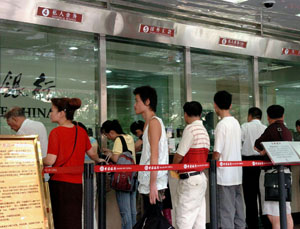| Tools: Save | Print | E-mail | Most Read |
| China Questions and Answers |
| Adjust font size: |
Q: China has lowered the RMB deposit interest rate eight times since 1996, but residents' savings have still grown at a rate of more than 1 trillion yuan (US$120.92 billion) annually. What is the reason behind this growth? How will the government encourage residents to invest or consume? A: In the late 1980s and early 1990s, the savings of Chinese urban and rural residents were once considered a "caged tiger." The government always worried that this tiger would affect market prices, lead to inflation, and harm social and economic development once it came out of the cage. From May 1, 1996 to February 2002, the RMB deposit interest rate decreased eight times. The interest rate for one-year deposits fell to 1.98 percent, the lowest rate since 1949. However, more than eight years have passed since then. The "caged tiger" hasn't escaped. On the contrary, it still lurks in its cage. Urban and rural residents' savings has snowballed from 3.85 trillion yuan (US$465.54 billion) in 1996 to 12.6 trillion yuan (US$1.52 trillion) in 2004, making China's savings rate second highest in the world, only after Japan. The main reason for continual growth in the savings deposits of Chinese urban and rural residents is the steady increase of residents' income. Especially after the mid-1990s, when consumption grew at a high speed, Households were nearly saturated with essential durable consumables, restricting the transfer from savings to consumption. Second, the Chinese tradition of keeping expenses within the limits of income, and the need to provide for elderly family members, children's education and in case of serious diseases have compelled residents to increase savings. Currently, among residents' savings deposits, preventive savings hold the bulk. As long as the deposit interest rate is acceptable and no extremely special situations appear, residents won't withdraw their deposits. Third, China's financial market develops slowly when there is no secure and stable channel for urban and rural residents to invest money in. The present investing channels are of low return but of high risk. Having few alternatives, residents have to let their meager savings flow into the banking system. Under China's present situation, depositing money in banks is a low-return activity, but at least it's safe. Fourth, although the securities and insurance markets have developed quickly, products with good security, fluidity and profitability are still in short supply. Chinese residents are enthusiastic in subscribing for treasury bond, indicating there is a great demand for investments in treasury bonds that are comparatively safe and with an interest rate higher than bank deposits. If some investors temporarily withdraw their investments in treasury bonds, they will still put the money into savings, as there is no other good way to invest. They have to wait for another chance to reinvest. To encourage Chinese urban and rural residents to transfer preventive savings to investment savings, the country is facilitating the reform of social security, establishing a social security system covering the whole society, including all laborers, and easing residents' uncertain expectations of future income, to reduce the amount of preventive savings. Meanwhile, a higher education loan system and education insurance will be established, promoting new kinds of education savings deposits and developing funds that have the function of inflation-adjusted savings deposits.
|
| Tools: Save | Print | E-mail | Most Read |
 |
| Related Stories |
|
Product Directory China Search |
Country Search Hot Buys |
